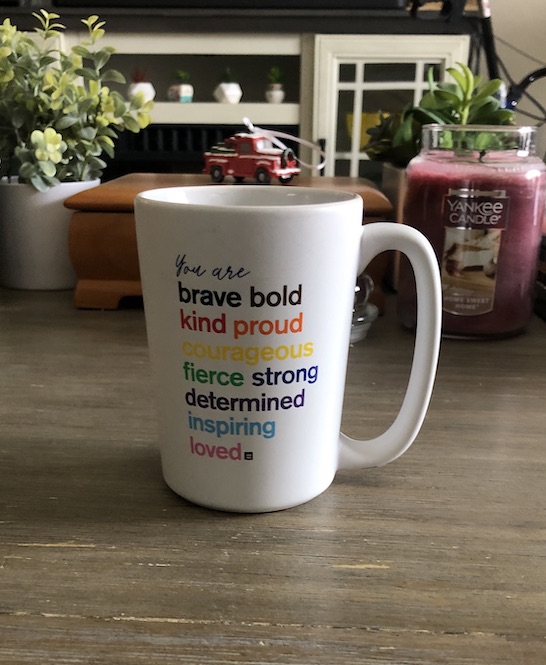My husband gave me a coffee mug that got me thinking about the importance of affirmation. It’s nothing fancy as coffee mugs go, but the rainbow of words on the outside inevitably gives me a lift. It says, “You are brave, bold, kind, courageous, proud, fierce, strong, determined, inspiring, loved.”
 With the joy and confidence such words bring, why do we often feel silly saying (or even thinking) things like this about ourselves? The most likely reason is that we’ve spent a lifetime being told that we shouldn’t brag about our accomplishments, potential, or the good qualities we possess. (Have you ever noticed how often people say “myself” instead of “me” when referring to themselves in everyday conversation?) But meditating on our positive characteristics goes a long way toward building our sense of self-compassion or giving ourselves a break when things go wrong.
With the joy and confidence such words bring, why do we often feel silly saying (or even thinking) things like this about ourselves? The most likely reason is that we’ve spent a lifetime being told that we shouldn’t brag about our accomplishments, potential, or the good qualities we possess. (Have you ever noticed how often people say “myself” instead of “me” when referring to themselves in everyday conversation?) But meditating on our positive characteristics goes a long way toward building our sense of self-compassion or giving ourselves a break when things go wrong.
Affirmations are positive internal messages that not only help us feel better about ourselves in the short term but can change the way we think about who we are. This makes them a great way to turn the negative things we might ordinarily tell ourselves in everyday situations.
For example, when you’ve locked yourself out of the house again or the boss eviscerates the report you spent the last eight hours working on; affirmations can change that guilty voice in your head and turn it into something that will leave you feeling better about yourself.
Here are some affirmations you can use to celebrate your inner strength and potential:
I give myself permission to be myself.
I am strong.
I have value.
I am enough.
Replacing negative inner messages with positive ones is a great way to boost self-compassion, but experts tell us that affirmations are more effective if they are spoken out loud. Another way to ensure you’ll “take in” an affirmation is to say it first thing in the morning. Lastly, journaling about affirmations can make them more likely to become a part of you.
Examples of affirmations we can give others include:
I believe in you.
You bring a lot to the table.
You have come a long way.
You have great ideas.
No matter what you grew up believing about affirmation, these positive messages can be a vital part of maintaining overall mental health. They remind us of the strengths we carry inside that pull us through when outside forces make it hard to believe in ourselves.
* * *
References:
Kristenson, Sarah. (2022, May 23). 99 Encouraging Affirmations for Motivating Others. Happier Humans. https://www.happierhuman.com/encouraging-affirmations
Lively, Katherine J., Ph.D. (2014, March 10). Affirmations: The Why, What, How, and What If? Psychology Today. https://www.psychologytoday.com/us/blog/smart-relationships/201403/affirmations-the-why-what-how-and-what-if
Neff, Kristin, Ph.D. “n.d.” Why Self-Compassion is Healthier Than Self-Esteem. Self-Compassion.org.
About the Author
Charles Davis, MSW, has written for several academic publications and was a semifinalist for the 2023 Mason Jar Press 1729 Book Prize in Prose. He lectures on a variety of disability issues, including legal rights and sexuality. Mr. Davis also writes a blog on navigating loss and building a new life at: https://gayandgrieving.blog.
